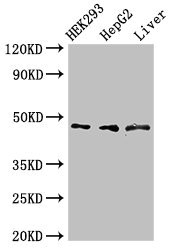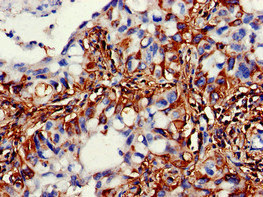Full Product Name
Rabbit anti-Homo sapiens (Human) ACADSB Polyclonal antibody
Alternative Names
2 MEBCAD antibody; 2 methyl branched chain acyl CoA dehydrogenase antibody; 2 methylbutyryl CoA dehydrogenase antibody; 2 methylbutyryl coenzyme A dehydrogenase antibody; 2-MEBCAD antibody; 2-methyl branched chain acyl-CoA dehydrogenase antibody; 2-methylbutyryl-CoA dehydrogenase antibody; 2-methylbutyryl-coenzyme A dehydrogenase antibody; ACAD7 antibody; ACADSB antibody; ACDSB_HUMAN antibody; acyl CoA dehydrogenase; short/branched chain antibody; acyl Coenzyme A dehydrogenase short branched chain antibody; mitochondrial antibody; OTTHUMP00000020685 antibody; OTTHUMP00000046795 antibody; SBCAD antibody; Short/branched chain specific acyl-CoA dehydrogenase antibody; short/branched chain specific acyl-CoA dehydrogenase; mitochondrial antibody
Species Reactivity
Human, Rat
Immunogen
Recombinant Human Short/branched chain specific acyl-CoA dehydrogenase, mitochondrial protein (34-253AA)
Immunogen Species
Homo sapiens (Human)
Conjugate
Non-conjugated
The ACADSB Antibody (Product code: CSB-PA001128LA01HU) is Non-conjugated. For ACADSB Antibody with conjugates, please check the following table.
Available Conjugates
| Conjugate |
Product Code |
Product Name |
Application |
| HRP |
CSB-PA001128LB01HU |
ACADSB Antibody, HRP conjugated |
ELISA |
| FITC |
CSB-PA001128LC01HU |
ACADSB Antibody, FITC conjugated |
|
| Biotin |
CSB-PA001128LD01HU |
ACADSB Antibody, Biotin conjugated |
ELISA |
Purification Method
>95%, Protein G purified
Concentration
It differs from different batches. Please contact us to confirm it.
Buffer
Preservative: 0.03% Proclin 300
Constituents: 50% Glycerol, 0.01M PBS, pH 7.4
Tested Applications
ELISA, WB, IHC
Recommended Dilution
| Application |
Recommended Dilution |
| WB |
1:500-1:5000 |
| IHC |
1:20-1:200 |
Storage
Upon receipt, store at -20°C or -80°C. Avoid repeated freeze.
Lead Time
Basically, we can dispatch the products out in 1-3 working days after receiving your orders. Delivery time maybe differs from different purchasing way or location, please kindly consult your local distributors for specific delivery time.
Usage
For Research Use Only. Not for use in diagnostic or therapeutic procedures.








